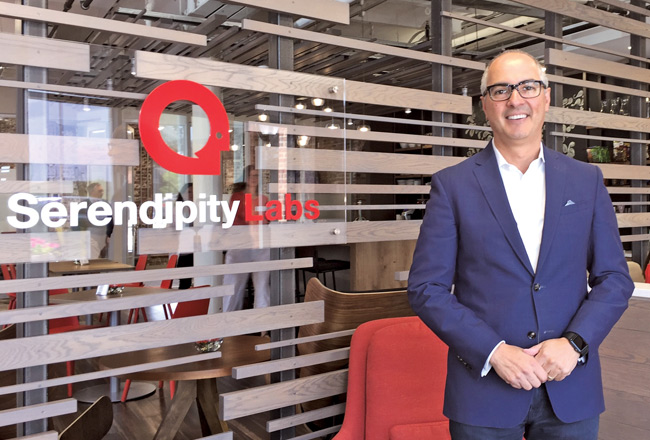
Serendipity Labs, the self-defined “upscale hospitality brand” in the increasingly competitive co-working industry, has entered the international business world in a deal that will take the 6-year-old company far beyond its roots in Westchester and Fairfield counties.
Serendipity in July announced a joint venture with Chinese co-working titan UrWork in the opening of a 34,000-square-foot office at 28 Liberty St. in the Manhattan Financial District. The two companies also will connect their networks to allow their members to use any of their locations throughout the U.S. and China.
Using an app, members can make reservations for meeting space, have a place to work for the day, house remote teams or have a reliably accessible local address.
UrWork serves 2,400 companies across 24 cities in China and started its overseas expansion last year, which to date includes the opening of co-working offices in Singapore, London, and Taiwan.
Serendipity Labs CEO John Arenas, who launched his company in 2011 at 80 Theodore Fremd Ave. in Rye, said that UrWork first approached him about two years ago to learn about the U.S. co-working landscape.
“We ultimately agreed that a joint venture was the way to go,” Arenas said at Serendipity”™s Stamford operation at 700 Canal St. “We”™re co-branding (the New York City location) and will offer the same language skills, in this case Mandarin, for our clients.”
Arenas described the venture as that of “two fast-growing, established companies” who will both benefit by the deal – and perhaps fire a shot across the bow of WeWork, a similar company that provides shared workspace, community and services for entrepreneurs, freelancers, startups and small businesses. Founded in 2010 and headquartered in New York City, WeWork has locations in 19 U.S. cities and 12 countries, including China, India, Germany, France and the U.K., and has a valuation of about $20 billion.
Backed by such investors as Sequoia Capital, Zhen Fund, Noah Wealth Management and Sinovation Ventures, UrWork had a valuation of $1.3 billion as of June. It has 78 locations in 20 cities, serving over 3,000 enterprises and 30,000 members.
Serendipity has attracted over $125 million in capital, including $24 million in private equity and over $100 million committed from its area franchise developers, Arenas said. The firm has about 4,000 members at its six established locations in Rye; Stamford; Ridgewood, New Jersey; Aventura, Florida; Bethesda, Maryland; and Chicago.
“This is a huge step forward for us,” Arenas said of the international joint venture. “It definitely puts us on the global map.”
Arenas attributed Serendipity”™s momentum to both his personal experience in the hospitality space and a little luck.
“When I started in Rye four-and-a-half years ago, most people didn”™t know what co-working was. Today there”™s so much more awareness across the board, with both individuals and companies recognizing the value of a dedicated offsite workspace.”
Co-working spaces are designed both to relieve a person”™s isolation and lack of human interaction by placing him or her alongside employees of other companies and entrepreneurs in individual workspaces and to offer large event and meeting spaces for established firms looking for an offsite change of scenery.
“We”™re all about recognizing the value of community,” Arenas said. “We provide a place where people can arrive and feel they”™re part of a community of similar people.” The company rotates work by local artists on its walls and strives to promote local events it believes will be of interest and relevance to its members, along with hosting lectures, meetups and the like.
On the corporate side, Serendipity”™s client list includes Philips, GE Healthcare and PepsiCo.
At Philips North America, Liz Scarnati, assistant to the vice president of sales, called Serendipity”™s Stamford office at 700 Canal St. “an excellent resource” utilized by the technology company”™s New York City and Connecticut team.
The son of an urban planner, Arenas started out as a civil engineer before moving to a relationship manager position at Citigroup. By 1996, he had gone off on his own to form Stratis Business Centers, which grew to be an 11-state network of office centers. When international workspace provider Regus (now IWG) acquired Stratis in 2001, Arenas moved to Westchester County to serve as president and general manager of Regus Americas.
In 2005, he founded another on-demand workspace company, Worktopia, which at its height had over 1,000 venues in 50 countries. It was acquired by a company called SignUp4 in 2011, which in turn was acquired by CVent for $22.4 million in 2015.
Then came Serendipity, which its CEO believes is built to last.
“What differentiates us is our ability to fuse the needs of the workspace with hospitality,” he said. “Most co-working spaces, including others here in Stamford, provide the expected amenities and the ability to brainstorm with other residents who may not be in the same line of business but from whom you can learn.”
Serendipity”™s m.o. is to create a network where on-the-go members can take advantage of the same kind of support, security and compliance with regulatory requirements in any of the firm”™s offices.
Having essentially created such a network in the tri-state area ”” a Princeton office is due to open in August and Garden City on Long Island is another target, Arenas said ”” Serendipity has expanded its East Coast network with its Maryland and Florida offices and plans to open in Miami later this year. The firm also plans openings in Nashville; Sugar Land, Texas, and at two locations in Columbus, Ohio.
In Stamford, Serendipity Labs is about to add 9,000 square feet to its existing 13,000-square-foot space.
The plan from the start was to have a network of 100 labs, and Arenas said the company is well on the way to reaching that goal.
Also working in Serendipity”™s favor is the Financial Accounting Standards Board”™s Accounting Standards Update, issued last year. Intended to improve financial reporting about leasing transactions, it affects all companies and other organizations that lease assets such as real estate, airplanes, and manufacturing equipment.
Having to report such leasing activity can affect a company”™s bottom line. Combined with the move toward mobility, Arenas said the new accounting standards make an option like Serendipity all the more attractive.
“That all counts towards debt now,” he said of those leased assets. “Companies are now trying to get out of those smaller leases but still maintain a satisfactory environment for employees who work there. We are a good solution for that.”
Arenas said Serendipity was “a little ahead of the curve” with the co-working phenomenon.
“We always believed that this industry should be recession-resistant. The thinking was that in an economic downturn, companies would reduce their headcount and turn more towards individuals as freelancers or part-timers ”” with us providing the professional environment that they need.”
However, economic swoons in 1986, 1992 and 2001 didn”™t generate that expected activity. But in the wake of the 2011 downturn, Arenas said, “Our industry didn”™t break. Instead it was the employee-employer relationship that broke, with people becoming free agents and companies learning that they could lease space at an outsourced office until they could afford to bring people back full-time, if they ever did.”
Five years from now, said Arenas, he expects the co-working industry will be well into the merger and joint venture phase exemplified by Serendipity”™s deal with UrWork.
“Over the next year, I see us in Canada and making inroads in countries like the U.K., Netherlands, Germany and France, probably with local partners on a franchise basis,” he said. “We”™re absolutely on track to increase our global footprint significantly.”






















